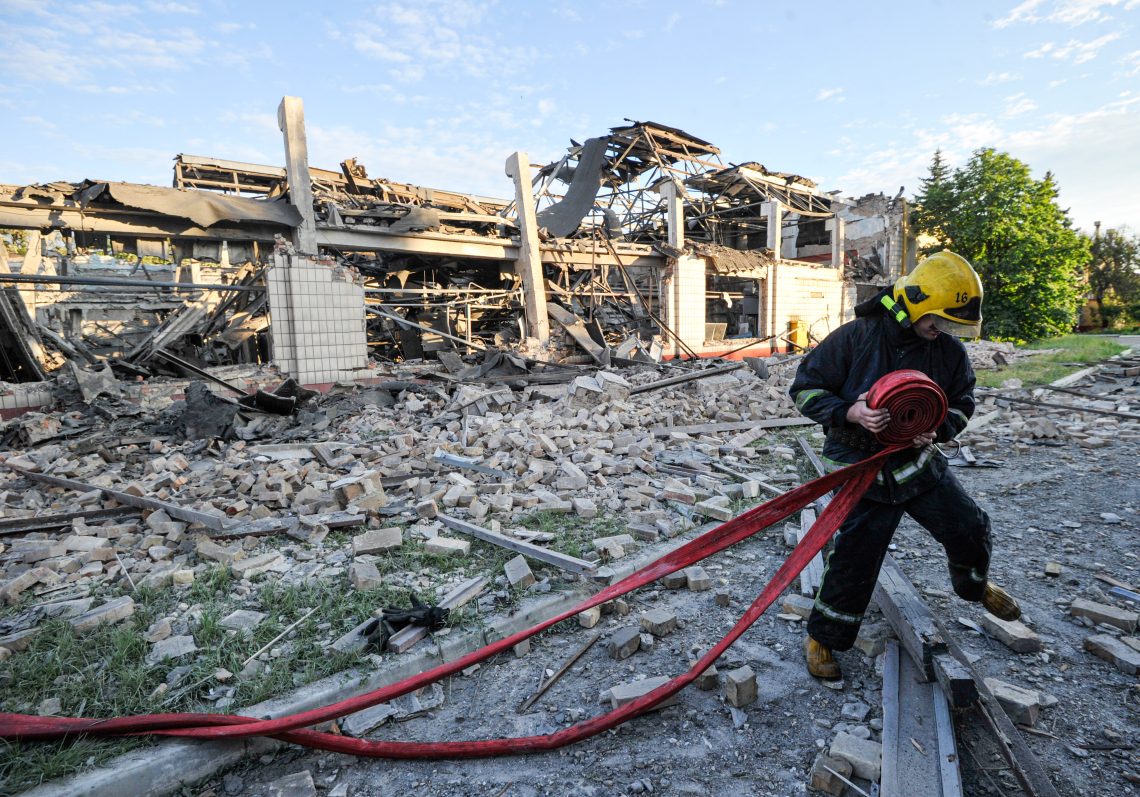How Ukraine can emerge from war independent and prosperous
Russia’s invasion could end in several ways that favor Ukraine, but it is unlikely that Kyiv will get everything it wants.

In a nutshell
- Minimally, Ukraine needs Kyiv and Odesa to remain viable
- While Ukraine wants to fight on, it needs the West’s support
- Long-term militarization of Ukraine is needed to deter Russia
The war in Ukraine is a baptism by fire for an independent nation. The outcome could shape global security, peace and freedom in the 21st Century.
Civilization may be in the antechamber of World War III, with 141 states voting in the United Nations to condemn Russia’s invasion and 43 states agreeing in Ramstein, Germany, to support Ukraine’s defense with weaponry.
Also, in a battle of banks against tanks, progressively tougher Western economic and financial sanctions are targeting Russia as an enemy. The sanctions, however, are far from universal and have a history of being evaded. The four other BRICS countries besides Russia (Brazil, China, India and South Africa) refuse to participate. They represent 50 percent of humanity and 25 percent of global economic output. Sanctions are an open invitation for smugglers, crooks and straw men. Economic penalties raise costs, but they rarely succeed in changing the behavior of the targeted country – and thus far have not deterred Russian President Vladimir Putin from continuing the war. Nations that impose sanctions also incur their own costs. Over time, these costs may make sanctions less popular in the imposing nations.
Moreover, Russia’s oil and natural gas, which provide 40 percent of the Kremlin’s state budget, have until recently been exempted from European sanctions. Even the recent European Union phased-in ban only targets seaborne oil and allows exemptions for oil transported through pipelines to countries such as Hungary, the Czech Republic and Slovakia. Stopping the purchase of Russian natural gas is proving to be more difficult. The only major sanction against Russian natural gas thus far has been Germany’s decision to halt the new Nord Stream 2 pipeline. Yet high oil and gas prices have allowed Russia to earn more revenue despite producing and selling less.
Sanctions are not an end in themselves. They seek to modify behavior. Thus, the focus of the global debate should be on the conditions under which sanctions can be lifted.
What is our strategic aim in this war? What are the minimum conditions that we consider acceptable to end the fighting? And how do we consult with Kyiv over these conditions?
Currently, the ruble has recovered, although currency controls have helped prop up its value. So far, there are no shortages in essential supplies for the Russian population. Imports have collapsed, and exports, though reduced in volume, are generating enormous surpluses. Although Russian defaults have been avoided so far, Moscow could soon find itself in the curious position that despite a huge surplus in its trade balance it cannot repay international credits. Inflation is high at 18 percent, but Western countries are enduring inflation at about half that rate.
As Western countries debate whether to grant Ukraine all the weapons it is seeking to defend itself, the West must define its goals. What is our strategic aim in this war? What are the minimum conditions that we consider acceptable to end the fighting? And how do we consult with Kyiv over these conditions?
The West cannot reach an understanding with Russia over the head of Ukraine. But without Western support, Ukraine could soon collapse. Therefore, any peace formula must be thrashed out involving Kyiv, the United States and Russia. Moscow’s forces have failed to deliver a death blow to Kyiv. But they have created a stranglehold over Ukraine.
The West and Ukrainian President Volodymyr Zelenskiy will have to negotiate with a Russian government one day. Russia will remain Europe’s neighbor. Worse, it will remain Ukraine’s neighbor with a very serious potential of stoking tensions and keeping Ukraine under an uncomfortable permanent threat.
Three avenues for peace
There are three ways this war might end without Mr. Putin emerging victorious:
Minimal goal
The minimal condition is a viable, independent Ukraine shaping its future in freedom and self-determination. This includes the capital Kyiv and access to the sea. Neither Kyiv nor Odesa can be allowed to fall into Russia’s hands. In this scenario, Ukraine might lose territory – and 20 percent of Ukraine is now under Russian control. But Kyiv would have to weigh this loss against the opportunity of averting further death and destruction.
Russia has a long history of breaking its agreements involving Ukraine, including the 1994 Budapest Memorandum in which Moscow agreed to respect Ukraine’s internationally recognized borders in exchange for Kyiv’s surrender of its nuclear weapons arsenal. Assuming Russia can be trusted, and any new agreement enforced, Ukraine could obtain conditions for rebuilding a normal life. Finland chose this option in 1940. It ceded Karelia, about 10 percent of its territory, to save the rest of Finland. West Germany chose this path when it gave peaceful reconstruction precedence over reunification. Unfortunately, Russia’s war-inebriated propaganda leaves little room to believe in such an outcome.
Ukraine’s gross domestic product has fallen by almost 50 percent since the full-scale Russian invasion on February 24, 2022. Relentless Russian bombings are destroying Ukraine’s infrastructure while 25 percent of its population is displaced. Because of Russia’s illegal blockades of ports on the Black and Azov seas, Ukraine’s agricultural base – which feeds an estimated 400 million people in the world – is threatened.
Losing an estimated $5 billion per month, Ukraine’s war effort and economy are being sustained by Western financial support and heavy borrowing. Ukrainians are fighting for their survival and polls show that 82 percent are against any territorial concessions to Russia. But could this support erode in Ukraine if the war drags on inconclusively?
In June 2022, Ukraine runs the risk of suffering key military defeats that should be prevented at all costs. If the Kremlin’s forces succeed in conquering major Donbas cities such as Severodonetsk in Luhansk Oblast or Kramatorsk in Donetsk Oblast, Russia could wind up controlling and possibly annexing territory east of a line running from Kharkiv in the north to Kherson in the south. If Russia can focus all its forces on the southern cities of Odesa and Mykolaiv, it could establish a corridor along the rim of the Black Sea that effectively turns Ukraine into a landlocked nation, tripling Russia’s Black Sea coastline to 600 kilometers.
This possibility, unfortunately, is not unlikely.
Better goal
A more ambitious goal, and one that should be viewed as a moral and political imperative, is a return to the status quo of February 23, 2022, in which Russia keeps its control over 7 percent of Ukrainian territory seized in the Kremlin’s initial 2014 military invasion – Crimea and parts of the eastern Donbas bordering Russia. Today, Russia controls more than 20% of Ukraine’s territory. It is questionable whether Ukraine’s forces can achieve this goal militarily. Reconquering territories lost to Russia since February 24, 2022, would require a switch from defensive to offensive operations against forces that are entrenched and enjoy stable supply lines. This trench warfare could lead to a high loss of life and equipment on both sides. But Ukrainian success in this aim is deserving of any reasonable support.
This possibility is less likely.
Optimal goal
Ukraine seeks to regain all its territory – including Crimea and the Donbas territories that Russia seized in 2014. The nation, however, faces a protracted struggle in doing so. The Russian-Ukrainian land border stretches nearly 2,000 kilometers and would require strong fortification and surveillance.
There are other complications. A military reconquest of Crimea would be construed as an attack on Russia since Moscow considers the peninsula to be part of its territory and of singular strategic importance as the base for its Black Sea fleet. If threatened with surrendering the illegally annexed peninsula, President Putin might resort to all military means, including nuclear weapons. The same risk applies should Russia claim other Ukrainian territories that it occupies, as seems highly probable.
This possibility is very unlikely.
The present Russian government has shown utter disregard for legal obligations. How could anyone trust the word of President Putin?
Winning the peace
Any outcome must ensure the sovereignty and territorial integrity of Ukraine, including postwar security protections. The present Russian government has shown utter disregard for legal obligations. How could anyone trust the word of President Putin? The concept of converging interests through economic interdependence has been discredited. The German maxim of Wandel durch Handel – change through trade – was a courageous tightrope act – unfortunately without a net.
With the legacy of willful atrocities and colossal devastation, how could any Ukrainian government trust Russia? Termination of hostilities requires a strong deterrent against any fresh aggression. This implies a massive militarization of Ukraine. It may have to renounce formal NATO membership. But informally Ukraine will be part of West European defense parameters, sustained by a massive U.S. presence, probably including soldiers and equipment on the ground that will serve as tripwires like the allied forces did in West Berlin. The challenge in Ukraine is the demarcation of a “red line,” since along that line will fall a new Iron Curtain. Ukraine will resemble postwar Germany: a divided country, highly militarized, with two systems and two contrasting concepts of national development in open confrontation, separated by an impenetrable frontier.
Opportunities in the war’s aftermath
Ukrainian losses have been staggering. Russian attacks have killed tens of thousands of people already, although a precise death count is impossible in Kremlin-occupied territory. Russia has destroyed hundreds of billions of dollars in Ukrainian property and infrastructure.
But after the war, Ukraine can seize the opportunity to rebuild itself into a stronger and more resilient nation.
Postwar Ukraine could be a place where modern infrastructure replaces the outdated Soviet one. It could become a more confident and community-oriented nation that stifles corruption, adopts systemic reforms and reduces the influence of oligarchs. Ukraine could experience an economic miracle if the rest of the world supports an ambitious reconstruction drive akin to the Marshall Plan after World War II that rebuilt Western Europe.
But the Marshall Plan 70 years ago required security and stability in the recipient nations. Achieving this predictability will require a military presence strong enough for Ukraine to deter any further aggression from Moscow.
Scenarios
There are three scenarios for ending combat:
1. A long war of attrition simply dies down over time, an outcome that could favor Ukraine, provided that current supplies of equipment and training are sustained. This possibility is highly likely.
2. Both warring parties agree on a formal cease-fire, with full knowledge that provisional armistices often harden into accepted facts, like in Korea or in the Middle East. For Ukraine to accept a cease-fire without having regained all occupied territories would be a painful and risky loss. If Russia were to retreat from all or most of the occupied territories, this would be an admission that the invasion of Ukraine was in vain. Russia has lost more than 30,000 soldiers in three months, while its total losses in Afghanistan were 50,000 troops in 10 years. This possibility is unlikely.
3. The third option would be a formal peace treaty. As long as Mr. Putin remains president, such a treaty is inconceivable. It would demand a reversal of anti-Ukrainian and anti-Western propaganda and an end to the glorification of Russia’s military past. It would involve acknowledging an error and, worse, a crime. It would demand a radical rewriting of Russian history. A peace treaty might be possible only with a new Russian government, but one that is anti-Putin. For now, such a possibility is not in sight. This scenario is exceedingly unlikely.








